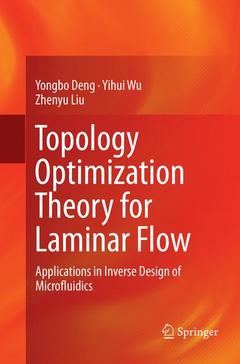Topology Optimization Theory for Laminar Flow, Softcover reprint of the original 1st ed. 2018 Applications in Inverse Design of Microfluidics

This book presents the topology optimization theory for laminar flows with low and moderate Reynolds numbers, based on the density method and level-set method, respectively. The density-method-based theory offers efficient convergence, while the level-set-method-based theory can provide anaccurate mathematical expression of the structural boundary.
Unsteady, body-force-driven and two-phase properties are basic characteristics of the laminar flows. The book discusses these properties, which are typical of microfluidics and one of the research hotspots in the area of Micro-Electro-Mechanical Systems (MEMS), providing an efficient inverse design approach for microfluidic structures. To demonstrate the applications of this topology optimization theory in the context of microfluidics, it also investigates inverse design for the micromixer, microvalve and micropump, which are key elements in lab-on-chip devices.
Area of work:
Simulation and optimiza
tion in hydrodynamics and mechanicsPartial differential equation constrained optimization problem and inverse problem, especially topology optimization, shape optimization and optimal control methods, design and manufacture of MEMS devices, especially the microstructure, microfluidics and photonic devices
Finite element method (Galerkin finite element, mixed finite element, multiscale finite element, vector finite element)
Yihui Wu received her PhD degree from Changchun Institute of Optics, Fine Mechanics and Physics (CIOMP), Chinese Academy of Sciences (CAS) in 1996. She has been a professor of CIOMP since 1999 and now she is a distinguished professor of CAS. She is the group leader of Micro/Nano research in CIOMP. Her research interests are high speed flywheel, spectrometer, Lab-on-a-chip and label-free photonic/phononic biosensors and super resolution imaging.
Zhenyu Liu received the Ph.D. degree in mechanical engineering from Dalian Universit
Date de parution : 02-2019
Ouvrage de 250 p.
15.5x23.5 cm
Disponible chez l'éditeur (délai d'approvisionnement : 15 jours).
Prix indicatif 158,24 €
Ajouter au panierDate de parution : 10-2017
Ouvrage de 250 p.
15.5x23.5 cm
Thèmes de Topology Optimization Theory for Laminar Flow :
Mots-clés :
Inverse design; Adjoint method; Density method; Level set method; Microfluidic channel



